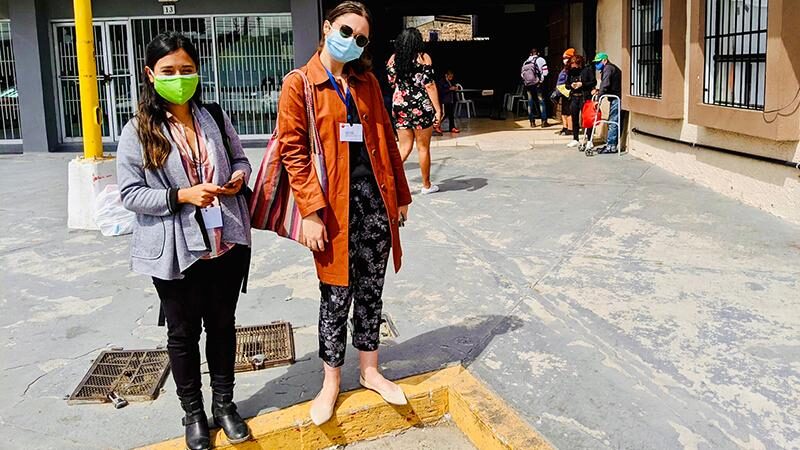
UMMS student Alana Slavin (right) and a PHR colleague in Tijuana outside Refugee Health Alliance, where the team conducted interviews with asylum seekers who have been separated from family members at the U.S.-Mexico border
Since Professor of Internal Medicine and Health Behavior and Health Education Michele Heisler became Physicians for Human Right’s (PHR) medical director last year, one UMMS student has worked with asylum seekers at the Mexico-U.S. border, a resident has started a project with refugee populations in the Middle East, and two other residents are planning projects of their own.
The experiment to connect U-M learners with meaningful advocacy through PHR comes at a critical time; the COVID-19 pandemic has exposed grave health disparities that — for many — emphasize the need for advocating on behalf of vulnerable populations.
“We recognize an appetite for experiences that move beyond traditional learning or academic research for a chance to make real-world impact,” said Heisler, M.D., MPA. “Traditionally, there aren’t many opportunities within the curriculum for learners to directly influence policy and programs.”
Third-year Internal Medicine Resident Rayan Kaakati is working with PHR’s Middle East and North Africa branch to review the available literature on sexual and gender-based violence against men and boys at refugee camps in conflict zones. Her month-long elective will take place this fall, although she is already meeting with PHR colleagues to lay some of the groundwork.
“There is a lot of research on violence against women but for men it’s under-reported,” said Kaakati, M.D. “My passion and interest is in refugee health issues, so this kind of advocacy is right up my alley. Working with PHR is a great opportunity.”
Fourth-year medical student Alana Slavin spent most of May in Juarez and Tijuana, Mexico. She met with asylum seekers who’ve been separated from family members at the U.S. border as a result of Title 42, which called for the deportation of anyone entered the US from a country considered high-risk for COVID-19.
“I conducted interviews with a PHR colleague to document cases of family separation, the circumstances, and the mental health implications,” Slavin said. “I got a very holistic picture of how the asylum process intersects with health. At the same time, I’m able to advocate for those who’ve been excluded from society because of COVID.”
The advocacy is vital, since PHR’s outcomes move beyond research and publications. When they are finished with their literature review, Kaakati and her team plan to write a paper and ultimately produce a practical guide to help clinicians recognize the signs of sexual violence in male patients. Likewise, Slavin’s team produced a PHR report and plan to write an Op-Ed to raise awareness about family separation during the pandemic.
Read more about Michigan Medicine’s burgeoning relationship with Physicians for Human Rights on the Global REACH website.


